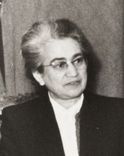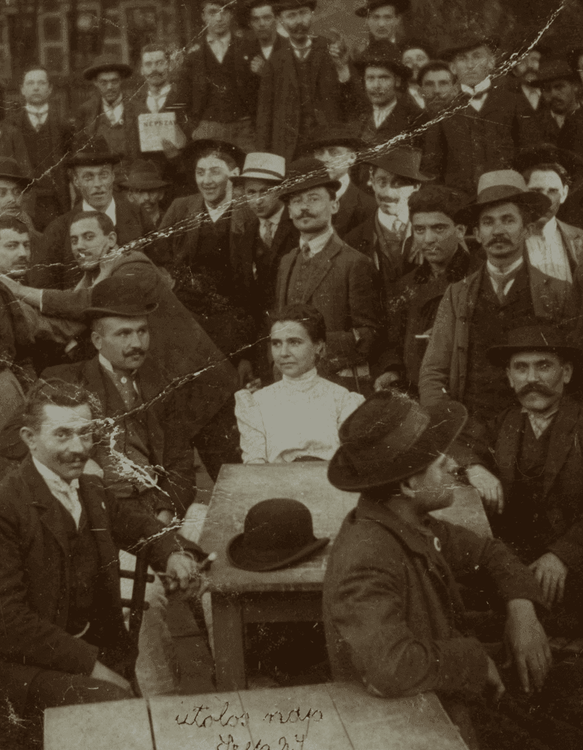Addressing the Needs of Roma
The Cultural Association of Gypsies in Hungary (MCKSZ), established in 1957, became a pioneering platform for advocating Romani rights. The association, lobbied for and initially led by Mária László, mobilized to address critical barriers affecting Romani communities’ access to employment, public services, and equal opportunities in a political environment that increasingly viewed Roma not as an ethnic minority but as a marginalized social group to be assimilated into the working class. At least initially, thanks to its commitment to class-based solidarity and antiracism, the state socialist regime supported the MCKSZ.

Mária László, secretary general of the Cultural Association of Gypsies in Hungary (Magyarországi Cigányok Kulturális Szövetsége), giving a speech (1957 or 1958)
The association’s agenda under László’s leadership included advocating for clean water, improved housing, and basic sanitation in Romani settlements, recognizing that these deficits hindered Roma from participating fully in public life. MCKSZ’s efforts highlighted how inadequate infrastructure, such as the lack of clean water, affected daily life and limited social mobility, particularly impacting Romani women who managed household needs and health.
Our state organizations could provide local authorities with much help in their work concerning Gypsies. We are often confronted with a lack of understanding, but also with the fact that due to not knowing the specificities of the life of the Gypsies, well-meant efforts have no results.
The employment of and discrimination against Roma were the key foci of the MCKSZ. One of the professional groups it specifically organized for were craftspeople like nail smiths. The MCKSZ supported the establishment of artisan co-operatives and worked to protect their livelihoods. It mediated between co-operative members, local officials, and sometimes resistant local communities. The association also called on various authorities to live up to the antiracist commitment of the state and address the persistent discrimination – including police harassment – against Roma.
Collaborations with national organizations, including the National Council of Trade Unions (SZOT), the National Council of Hungarian Women (MNOT), and the Hungarian Red Cross, were central to the MCKSZ’s strategy. Through these partnerships, the association worked to enhance Romani people’s access to employment, healthcare, and education, and aimed to ensure that Romani men and women had a voice in local decision-making. The MCKSZ succeeded in including Romani women activists in some local MNOT branches, and László also promoted the inclusion of Roma-related issues on local council agendas.
László’s radical criticism of racist practices against Roma and the shifting politics concerning Roma at the end of the 1950s led first to her dismissal from MCKSZ in late 1958, and in 1961 to the dissolution of MCKSZ altogether, marking the state’s shift away from supporting Roma-led initiatives, and the dependence of MCKSZ’s activism on a supportive political environment. Although short-lived, the association’s work created a foundation for Roma advocacy, demonstrating the potential of organized action for achieving social justice and laying important groundwork for future rights movements in Hungary.


